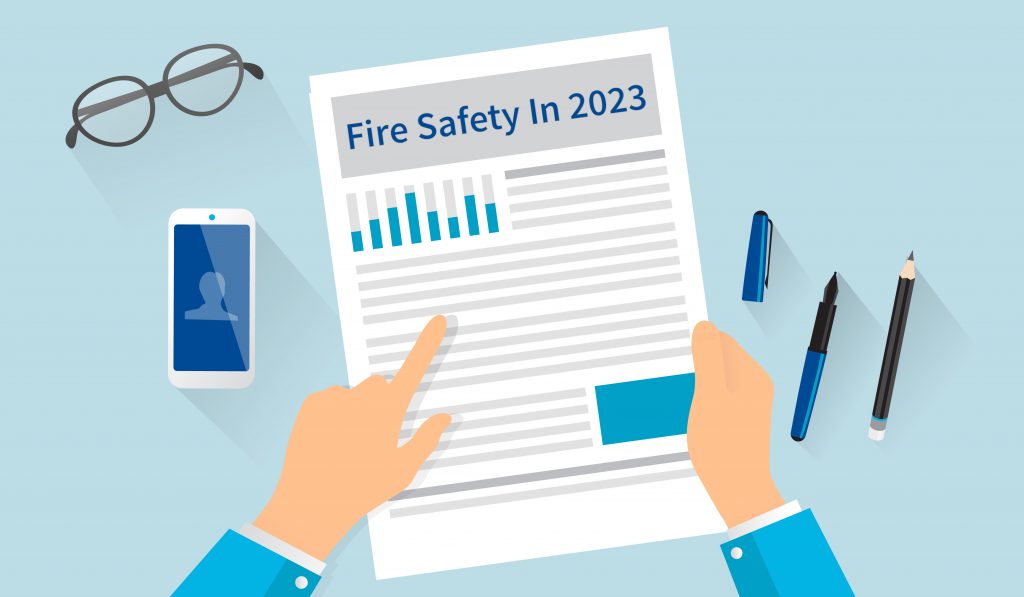Fire Safety Challenges For 2023
In January of this year, new regulations came into force that will affect those who own and/or manage multi-occupied residential buildings. The new legislation has mainly been introduced as a direct result of the inquiries that followed the Grenfell Tower disaster in 2017.
We covered elements of these regulations in an earlier blog, which you can read here, but it’s worth reiterating some of the main points, especially where you might need to obtain new equipment. It’s also important to spell out those that specifically apply to fire doors.

Equipment requirements
There are a number of things you need to do, but here we wanted to highlight where you need to obtain specialist equipment in order to comply with the new regulations.
For buildings over 18 metres in height, you have to provide access to hard copies of floor plans for the building, together with an orientation plan and contact details for the responsible person. These need to be kept in a secure premises information box (PIB), to which firefighters need to have access.
You also need to ensure that in areas where there are low light conditions, you install signs pointing to exit routes that are clearly visible.
You not only need to provide essential firefighting equipment, but also inform the FRS if it is out of order for more than 24 hours – that means regular maintenance on your fire extinguishers and other fire control measures is more essential than ever.
Fire doors
Phase 1 of the Grenfell Tower Inquiry noted that “Fire doors play an essential role in preventing or inhibiting the spread of smoke and toxic gases and in preserving the effective compartmentation of buildings”.
For that reason, the government has decided to tighten up the regulations surrounding what responsible persons for multi-occupied residential buildings in England with storeys over 11 metres in height need to do. These regulations have been made under Article 24 of the Regulatory Reform (Fire Safety) Order 2005.
It is now a legal requirement for the responsible person to undertake quarterly checks of all fire doors (including self-closing devices) in the building’s common parts. On a best endeavour basis, you must also carry out annual checks of all flat entrance doors (including self-closing devices) that lead onto a building’s common parts.
For all multi-occupied residential buildings that have at least two sets of domestic premises (with common parts), you also need to provide residents with information regarding the importance of fire doors to a building’s fire safety.
If you’re the responsible person for a building affected by these new regulations and you haven’t yet sourced the required equipment or expertise that will allow you to comply with the above, you need to get a move on, because you could already be breaking the law.
Here at Scutum London, we can help supply and install all the elements you need to bring your HMO building in line with the new regulations. This includes:
- Premises information boxes
- Exit route signage
- Firefighting equipment, including fire extinguishers
We can also carry out the legally required checks on the fire doors in your premises, together with annual fire risk assessments to ensure all your fire safety measures are up to date and in line with current regulations.
Get in touch with us now to find out more.
Request a Callback
Just fill in your details below and we'll get back to you as soon as we can!

About Scutum London
Scutum London is a leading expert in fire safety and security solutions for businesses and organisations located across South East England, including London and Surrey.
From fire alarms, fire extinguishers and fire risk assessments to access control, CCTV and intruder alarm systems – and a lot more besides – we offer a comprehensive range of products and services designed to keep you, your business and your staff and visitors safe.
With decades of industry experience to call on, we’re proud to hold accreditations from leading trade associations and bodies such as British Approvals for Fire Equipment (BAFE), the British Fire Consortium, the Fire Industry Association (FIA) and Security Systems and Alarms Inspection Board (SSAIB).
If you’d like to find out more about Scutum London, get in touch with our friendly team or explore our products and services on our site.

